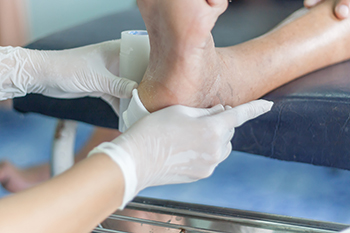

Pressure injuries on the heel bone, also called heel pressure ulcers, result from prolonged pressure and friction. The heel is the second most common site for such injuries due to its small area bearing the weight of the lower extremities. People with immobility, diabetes, leg spasms, or impaired blood flow are more susceptible to these injuries, affecting their quality of life. Prevention and healing involve alleviating pressure by using supportive devices. Such injuries can lead to open wounds, blisters, or deep tissue damage, increasing the risk of infection. Treatment options include pressure relief, proper wound care, specialized cushioning or boots, and, in severe cases, surgery. Due to the complexity and potential complications of such foot wounds, if you suffer from this, it is suggested that you make an appointment with a podiatrist for care.
Wound care is an important part in dealing with diabetes. If you have diabetes and a foot wound or would like more information about wound care for diabetics, consult with Dr. Harris L. Klear from Burlington County Podiatry Associates. Our doctor will assess your condition and provide you with quality foot and ankle treatment.
What Is Wound Care?
Wound care is the practice of taking proper care of a wound. This can range from the smallest to the largest of wounds. While everyone can benefit from proper wound care, it is much more important for diabetics. Diabetics often suffer from poor blood circulation which causes wounds to heal much slower than they would in a non-diabetic.
What Is the Importance of Wound Care?
While it may not seem apparent with small ulcers on the foot, for diabetics, any size ulcer can become infected. Diabetics often also suffer from neuropathy, or nerve loss. This means they might not even feel when they have an ulcer on their foot. If the wound becomes severely infected, amputation may be necessary. Therefore, it is of the upmost importance to properly care for any and all foot wounds.
How to Care for Wounds
The best way to care for foot wounds is to prevent them. For diabetics, this means daily inspections of the feet for any signs of abnormalities or ulcers. It is also recommended to see a podiatrist several times a year for a foot inspection. If you do have an ulcer, run the wound under water to clear dirt from the wound; then apply antibiotic ointment to the wound and cover with a bandage. Bandages should be changed daily and keeping pressure off the wound is smart. It is advised to see a podiatrist, who can keep an eye on it.
If you have any questions, please feel free to contact one of our offices located in Marlton and Delran, NJ . We offer the newest diagnostic and treatment technologies for all your foot care needs.